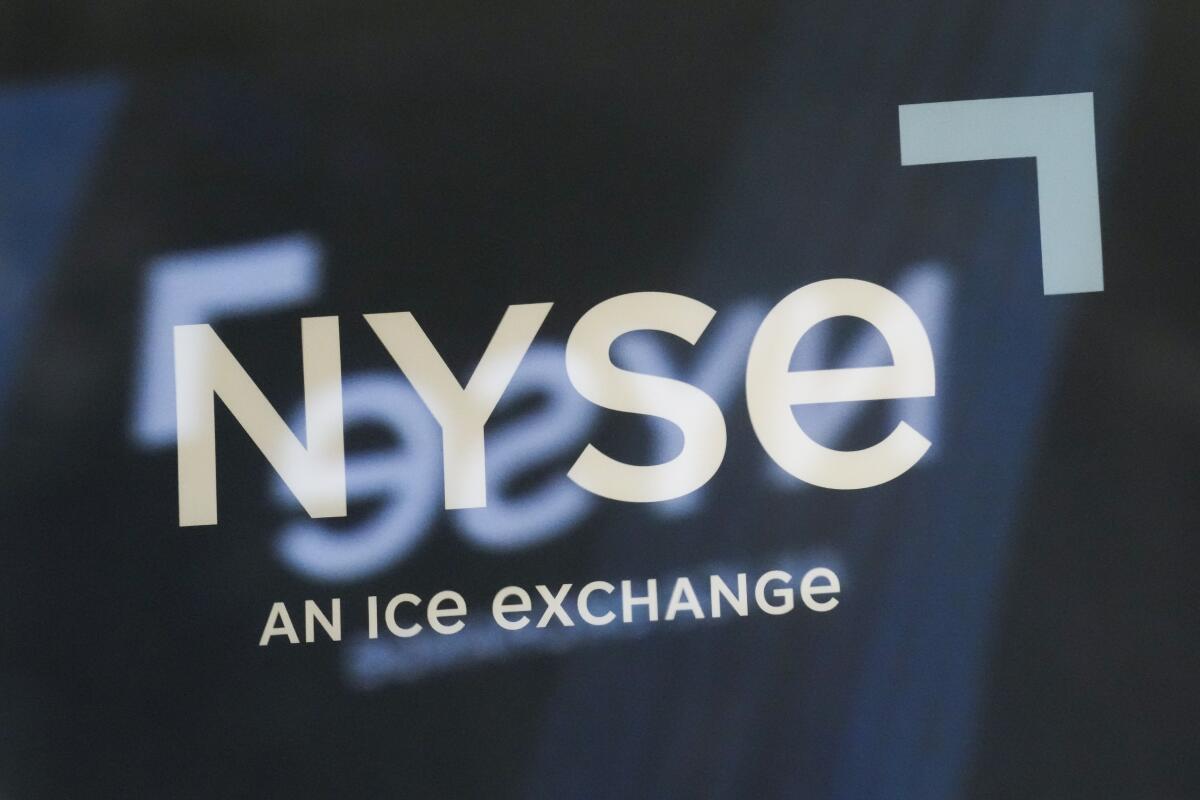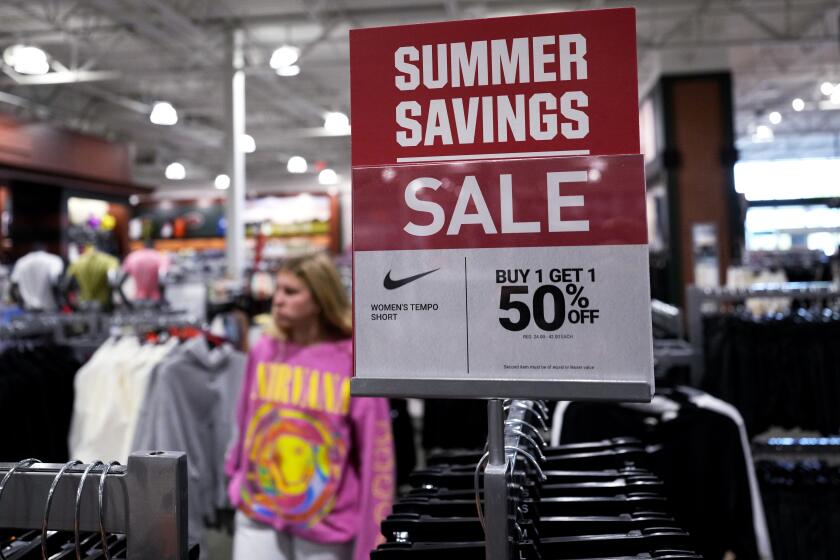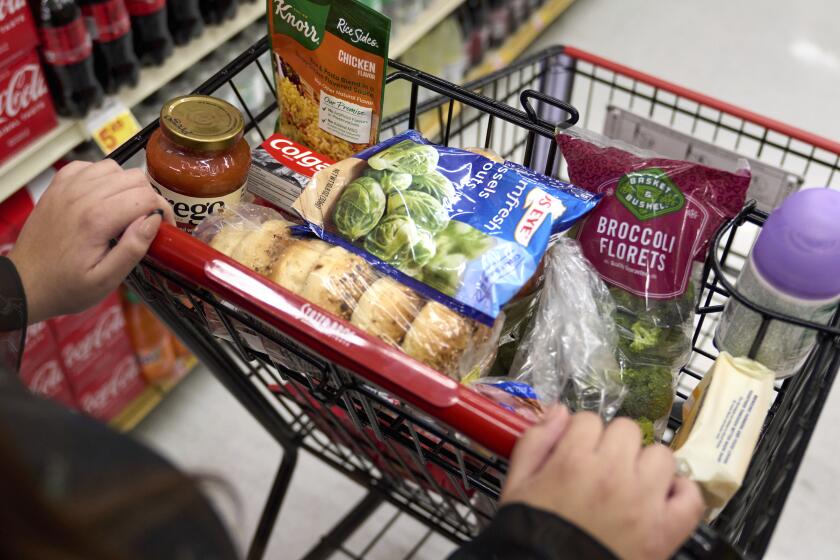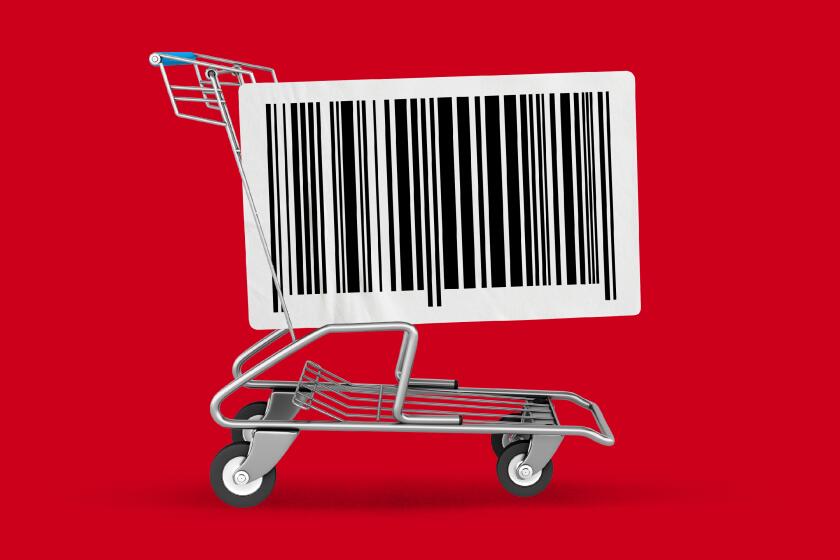Wall Street rises as inflation keeps cooling

- Share via
Stocks climbed Tuesday after a cooler reading on inflation cemented Wall Street’s bets for the Federal Reserve to hold off on hiking interest rates this week.
The Standard & Poor’s 500 rose 30.08 points, or 0.7%, to 4,369.01, its highest level since April 2022. The Dow Jones industrial average advanced 145.79 points, or 0.4%, to 34,212.12, while the Nasdaq composite jumped 111.40 points, or 0.8%, to 13,573.32.
The U.S. stock market has been on a roll amid hopes that the economy can avoid a severe recession and that inflation will fall enough for the Federal Reserve to take it easier on its rate increases. Tuesday’s report showed that food, fuel and other prices for consumers were 4% higher in May than a year earlier, the latest slowdown from inflation’s peak of 9.1% last summer.
The data pushed traders to immediately amp up bets that the Fed on Wednesday will announce no change to interest rates. If that happens, it will mark the first meeting in more than a year where rates are held steady.
The Fed has already pulled its benchmark short-term rate up to its highest level since 2007, a move that has slowed inflation but has also helped cause several U.S. bank failures and a contraction in the manufacturing industry.
Consumer prices in the United States cooled last month, rising just 0.1% from April to May and extending the past year’s steady easing of inflation.
Nvidia rallied 3.9% and was the strongest force pushing up the S&P 500, along with other technology stocks. Tech and other high-growth stocks are seen as some of the biggest beneficiaries of an ease up on rate hikes.
Nvidia has gotten an added boost from Wall Street’s recent frenzy around artificial intelligence, which has helped a select group of stocks make huge gains this year.
But unlike earlier this year, when a small cadre of stocks was responsible for most of the S&P 500’s gains, Tuesday’s climb was widespread, with 4 out of 5 stocks in the index rising.
Raw materials producers and industrial companies had some of the biggest gains in the S&P 500 amid hopes for a resilient economy. Miner Freeport-McMoRan rose 5.3%, and United Airlines climbed 3.7%, for example.
For all the optimism, though, much of Wall Street doesn’t believe the end has arrived yet for rate hikes. Many traders expect the Fed to resume raising rates in July, even if it holds steady this week.
Tuesday’s report showed that not only is overall inflation still too high, so are prices underneath the surface. The Fed prefers to look at inflation after stripping out food, fuel and housing costs, hoping to get a better view of where the trend is heading. Such “supercore” inflation is still above the Fed’s comfort level.
Consumers are switching grocery stores, brands and ingredients as they try to cope with the cost of food.
The worry is that additional hikes by the Fed will mean more pressure on the U.S. banking system, which has already cracked under the weight of much higher rates. Bank customers are pulling their deposits in search of higher yields at money market funds. At the same time, high rates are knocking down the values of bonds that banks bought and other investments they made when rates were low.
Three high-profile U.S. bank failures this year have shaken confidence in the system, and that has caused some banks to make it tougher for households and businesses to get loans. That puts additional brakes on the economy, raising the risk of a recession.
Zions Bancorp fell 1.6% after it appeared to cut its forecast for upcoming net interest income in an investor presentation.
Just two weeks remain until the start of the third quarter. That’s notable because many investors came into this year predicting a recession would hit by the third quarter, yet the job market has remained remarkably resilient and propped up the economy.
“Today, the recession has not arrived, and we are witnessing that reckoning in public market equity valuations via the recent rally,” said Alexandra Wilson-Elizondo, deputy chief investment officer of multi-asset solutions at Goldman Sachs Asset Management.
Inflation hasn’t been this high in decades. We compiled a snapshot of prices at ten grocery chains in the L.A. area. How does your local store stack up?
But that doesn’t mean the economy is in the clear. “With inflation stubbornly high, we do see the business cycle eventually ending in recession, as the Fed will have to break the back of the labor market to make material progress toward their 2% target” on inflation, she said.
In the bond market, yields initially dropped immediately after the inflation report but later recovered. The yield on the 10-year Treasury rose to 3.83% from 3.74% late Monday. It helps set rates for mortgages and other important loans.
The two-year yield, which moves more on expectations for the Fed, rose to 4.69% from 4.58%.
In markets abroad, Hong Kong’s Hang Seng rose 0.6% after China’s central bank lowered its one-week lending rate for the first time since last summer. That appeared to reflect official concern about the health of China’s economic recovery after growth in factory and consumer activity weakened.
The support coming from the world’s second-largest economy helped to push up the price of crude oil, which has struggled over the last year on worries about weaker demand. A barrel of U.S. crude rose $2.30, to $69.42. Brent crude, the international standard, rose $2.45, to $74.29 per barrel.
AP writers Matt Ott and Joe McDonald contributed to this report.
More to Read
Inside the business of entertainment
The Wide Shot brings you news, analysis and insights on everything from streaming wars to production — and what it all means for the future.
You may occasionally receive promotional content from the Los Angeles Times.













